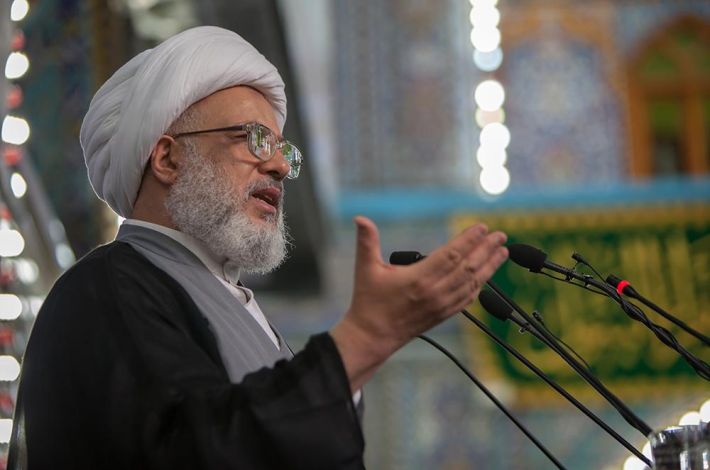The representative of the supreme religious authority; Sheikh Abd Al-Mahdi Al-Karbalai has shown in the second sermon of Friday's prayer of the 17th of Jumada Al-Ula 1437 AH corresponding to the 26th February, 2016 held in the holy shrine of Imam Al-Hussayn (peace be upon him), that those in positions of responsibility in the country have to follow the commandments of Imam Ali Ibn Abi Taleb (peace be upon both of them) to Malek Ibn Al-Hareth Al-Ashtar when he appointed him governor on Egypt, as he said:
Dear brothers and sisters, we will read in this sermon like in the last sermon some passages from the letter of the Commander of the Faithful; Ali Ibn Abi Talib (peace be upon both of them) to Malek Ibn Al-Hareth Al-Ashtar (Allah be pleased with him) so we remember how the Imam of Muslims was guiding those in power positions in dealing with the citizens and taking care of their rights, when he (peace be upon him) said:
"Thereafter, look into the affairs of your executives. Give them appointment after tests and do not appoint them according to partiality or favouritism, because these two things constitute sources of injustice and unfairness..." Then he (peace be upon him) said: "You should also check their activities and have people who report on them who should be truthful and faithful, because your watching their actions secretly will urge them to preserve trust with and to be kind to the people. Be careful of assistants. If any one of them extends his hands towards misappropriation and the reports of your reporters reaching you confirm it, that should be regarded enough evidence. You should then inflict corporal punishment on him and recover what he has misappropriated. You should put him in a place of disgrace, blacklist him with (the charge of) misappropriation and make him wear the necklace of shame for his offence."
And the Imam (peace be upon him) said: " you should keep away your army and your assistants such as the guards and the police so that anyone who like to speak may speak to you without fear, because I have heard the Messenger of Allah (Allah's prayers be upon him and his holy Household) say in more than one place, "The people among whom the right of the weak is not secured from the strong without fear will never achieve purity."
Then he (peace be upon him) said: "Do not make any land grants to your hangers on or supporters. They should not expect from you the possession of land which may cause harm to adjoining people over the question of irrigation or common services whose burden the grantees place on others. In this way, the benefit will be rather theirs than yours, and the blame will lie on you in this world and the next. Allow rights to whomsoever it is due, whether near you or far from you. In this matter, you should be enduring and watchful even though it may involve your relations and favourites, and keep in view the reward of that which appears burdensome on you because its reward is handsome."
And he (peace be upon him) said: "You should avoid shedding blood without justification, because nothing is more inviting of Divine retribution, greater in (evil) consequence, and more effective in the decline of prosperity and cutting short of life than the shedding of blood without justification. On the Day of Judgement Allah the Glorified, would commence giving His judgement among the people with the cases of bloodshed committed by them. Therefore, do not strengthen your authority by shedding prohibited blood because this will weaken and lower the authority, moreover destroy it and shift it. "
The Imam (peace be upon him) continued: "You should avoid self-admiration, having reliance in what appears good in yourself and love of exaggerated praise because this is one of the most reliable opportunities for Satan to obliterate the good deeds of the virtuous. Avoid showing (the existence of) obligation on your subjects for having done good to them or praising your own actions or making promises and then breaking them, because showing (the existence of) obligation destroys good, self-praise takes away the light of truth, and breaking promises earns the hatred of Allah and of the people. Allah, the Glorified, says: {Most hateful is it unto Allah that you say what you (yourselves) do (it) not.} (Qur'an, 61:3)"
Then he (peace be upon him) said: "Do not appropriate to yourself that in which the people have an equal share, nor be regardless of matters which have come to light with the excuse that you are accountable for others. Shortly, the curtains of all matters will be raised from your view and you will be required to render redress to the oppressed."
